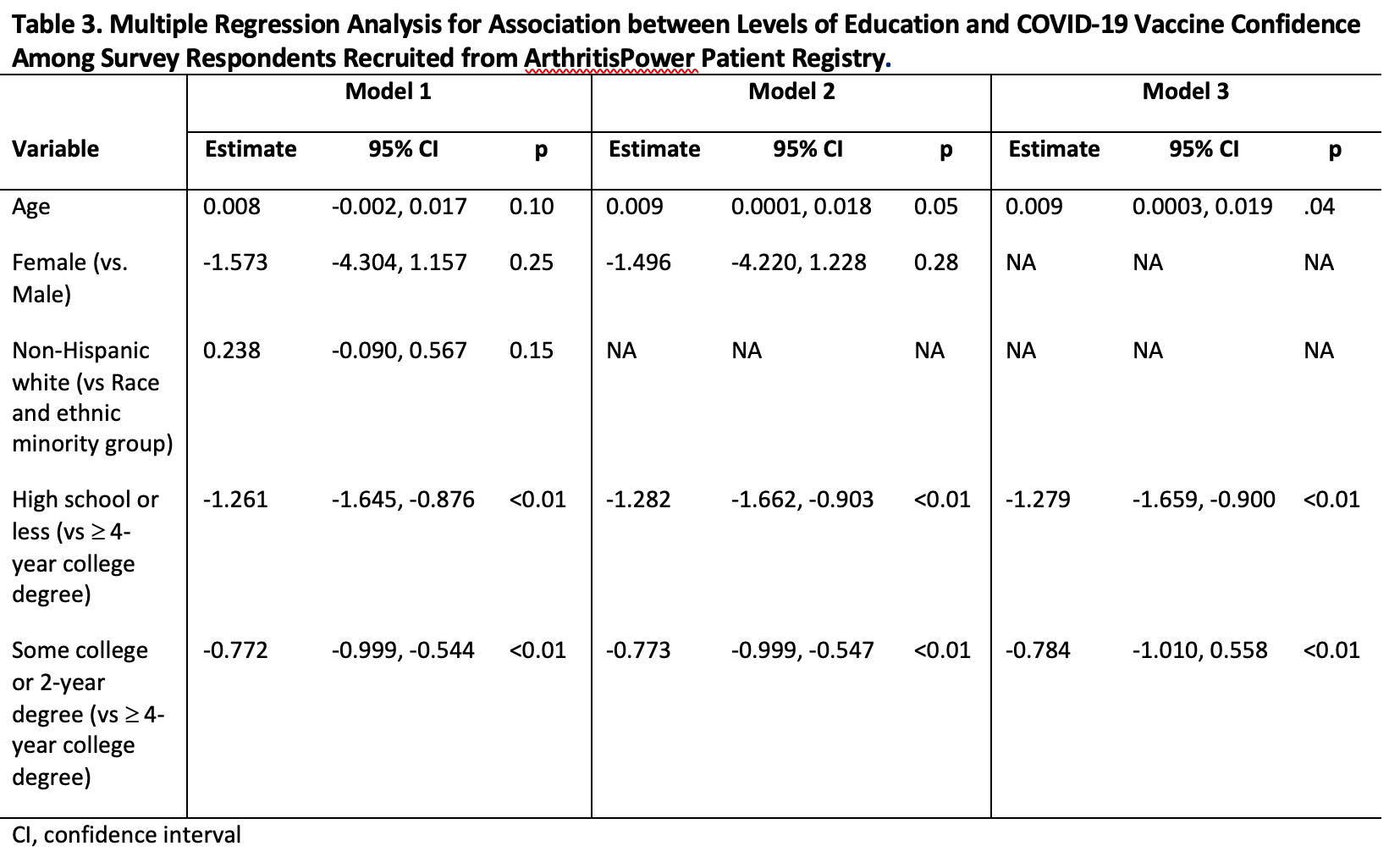Session Information
Date: Tuesday, November 9, 2021
Title: Patient Outcomes, Preferences, & Attitudes Poster IV: COVID-19 (1589–1613)
Session Type: Poster Session D
Session Time: 8:30AM-10:30AM
Background/Purpose: COVID-19 vaccine confidence is key to promoting vaccination efforts to mitigate the spread of COVID-19 among people with rheumatic diseases. The goal of this study was to examine concerns and beliefs about COVID-19 vaccination among patients with rheumatic diseases enrolled in a national patient registry and to determine if education level is associated with COVID-19 vaccine confidence.
Methods: Members of the national ArthritisPower patient research registry were invited to complete an online survey. Vaccination confidence was evaluated using 1-item confidence scale from the validated 5C scale (range 1 = strongly disagree to 7 = strongly agree, higher values are better). Descriptive statistics summarized demographic characteristics, receipt of and concerns and beliefs about COVID-19 vaccination. Multiple regression assessed whether education is associated with vaccine confidence after adjusting for the effect of age, sex, and race and ethnicity (Model 1), age and sex (Model 2), and age (Model 3). Individuals who self-reported being Hispanic, non-Hispanic Black and non-Hispanic other race were grouped together as race and ethnic minority group.
Results: Between February 9 and March 24, 2021, we received 1345 responses. Mean (standard deviation) age was 59 (11.5) years, 86% were female, 87% were non-Hispanic white (Table 1). While 54% stated they had been offered a COVID-19 vaccine, only 42% had received at least one dose of the vaccine (Table 2). Among those unvaccinated, almost 18% said they were unlikely to get vaccinated. The most common reasons for not getting the vaccine were use of immunosuppressive medications (52%), concerns of disease flare (51%), fear of side effects (31%), prior reactions to other vaccines (21%), fears about the vaccine modifying one’s DNA (16%). While deliberating about vaccination, the following information was thought to be important: long-term efficacy of the vaccine (63%), side effects of the vaccine (63%) and its efficacy (52%) among people with the same health condition as the respondent. Compared to vaccinated people, unvaccinated persons had significantly lower scores on the confidence scales [6.3 (1.2) vs 4.5 (2.2), p< 0.01]. After controlling for age, sex, and race, lower level of education was associated with lower vaccine confidence (Table 3).
Conclusion: During the initial COVID-19 vaccine roll out, a substantial minority of patient members of a large national patient registry had received COVID-19 vaccination. Approximately 1 in 10 said they were unlikely to get vaccinated, even among this highly engaged and research-interested patient population. The main reasons for not getting the vaccine were use of immunosuppressive medications and concerns about a disease flare. Respondents felt they needed more information about the safety and efficacy of the COVID-19 vaccine among people with their conditions. Lower education level was associated with lower vaccine confidence. These findings highlight the need for developing COVID-19 vaccination campaigns that are tailored to different levels of education for people with rheumatic diseases.
To cite this abstract in AMA style:
Danila M, Gavigan K, Rivera E, George M, Curtis J, Nowell W, Venkatachalam S. Perceptions About COVID-19 Vaccination Among Patients with Rheumatic Diseases Enrolled in a National Patient Registry [abstract]. Arthritis Rheumatol. 2021; 73 (suppl 9). https://acrabstracts.org/abstract/perceptions-about-covid-19-vaccination-among-patients-with-rheumatic-diseases-enrolled-in-a-national-patient-registry/. Accessed .« Back to ACR Convergence 2021
ACR Meeting Abstracts - https://acrabstracts.org/abstract/perceptions-about-covid-19-vaccination-among-patients-with-rheumatic-diseases-enrolled-in-a-national-patient-registry/



